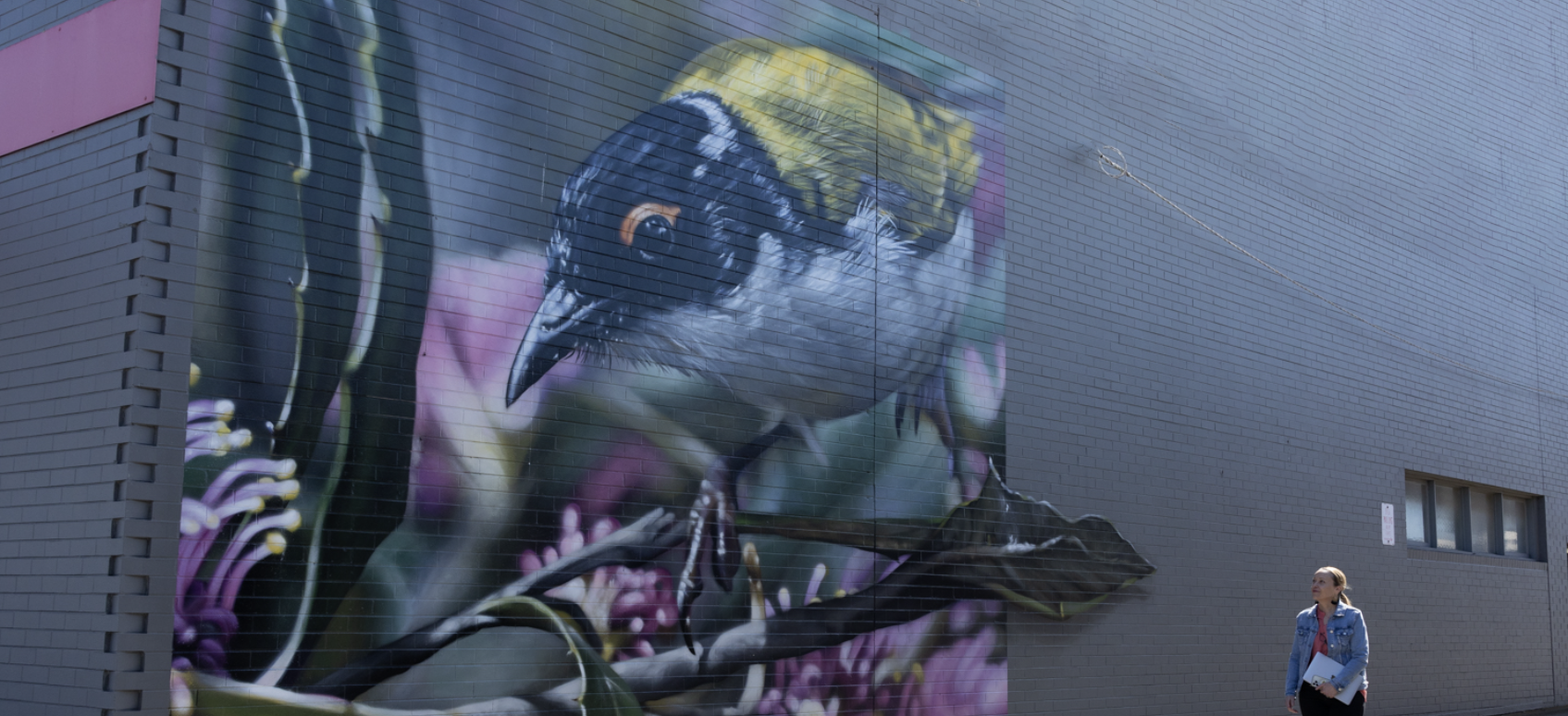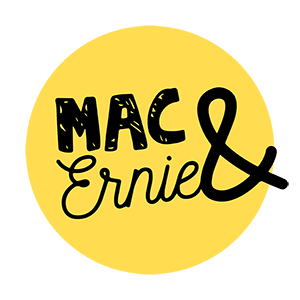
Frequently asked questions
-
It’s a great question and one you should definitely be asking. Marketing your business is important, and finding the right people to help you is even more so. Here’s a snippet of my ‘why’ and my ‘what’ and you are most welcome to book a free chat to ask any questions.
My why
I am here to support and guide small business owners, leaders and anyone overwhelmed by marketing or social media. Please click or tap here to read all about Mac&Ernie’s why.
-
I have a Bachelor of Arts in Media and Communications, a Masters of Marketing, Certificate in CX (Customer Experience) and I am a Certified Practising Marketer with the Australian Marketing Institute. In addition, I have spent my 25+ year career working in advertising and marketing roles in Melbourne and London - from account service to general manager. In early 2016 I founded Mac&Ernie and have been working full-time successfully in marketing and social media training and strategy since.
I have also been a volunteer and paid mentor and trainer in my community and beyond since 2016, working with organisations such as Small Business Victoria, Australian Small Business Advisory Service, Startup Gippsland, Inspiring Rare Birds, She Mentors, Ken Hore Tourism Mentoring and more.
You are welcome to follow me on LinkedIn where you can find out more about my career, awards and mentoring programs.
-
Absolutely. I need to get quite deep into your business to work out what you need to do to reach your goals. I never share any information. In fact it’s rare that I would even talk about who I am working with. I’m pretty old-fashioned that way so you won’t see me bragging about my clients (and some of them are pretty brag-worthy).
One of my business values is Integrity - this means different things to different people. To me it means openness and honesty and you’ll find that’s exactly how I roll. I have built a reputation for being trustworthy, and for guiding with honest feedback that is always kind.
-
I have a range of smart, impactful and relevant marketing, digital marketing and social media services - in group training, individual coaching and mentoring and strategy and planning. Please head here to view my current service offerings.
-
Mac&Ernie has worked with clients all over the world but I prefer to work with Australian and New Zealand businesses and community organisations. My education in marketing, branding and customer experience is specifically tailored to this local region. I am proudly certified by the Australian Marketing Institute.
-
I have a range of services from free to fully custom. Some of my prices are listed elsewhere on the website - under services and in the downloadable section. Most of what I do is custom and requires me to know what you need so I can price accordingly. I think that’s the fairest and most transparent way of working.
Please get in touch if you need something customised or if you would like to find out more about the value of working with me. You’ll get zero pressure. If we are a good fit and you have the budget and the time to smash your marketing then it will happen. Always ask about payment plans, I am happy to accommodate most requests.
About Social Media
I’ve developed a range of low-cost and accessible guides, workbooks and other resources to help you get started. Head to my Resources page;
Podcast
Blog
Newsletter
-
The best social media platform for advertising depends on several factors, including your target audience, industry, goals, and the type of content you want to promote. Each platform has its strengths and advantages. Book a chat if you want guidance that’s specific to your business or niche.
Here's a quick overview of some popular platforms and their key features:
Facebook:Wide audience reach across demographics.
Advanced targeting options based on user interests and behaviours.
Suitable for various content formats, including images, videos, and articles.
Robust ad analytics and tracking.
Instagram:
Visual platform with a younger audience.
High engagement with visually appealing content.
Ideal for industries that can showcase products through images and videos.
Effective for influencer partnerships.
Twitter/X:
Real-time updates and news-sharing platform.
Effective for quick updates and engaging with trending topics.
A limited character count encourages concise messaging.
LinkedIn:
A professional network for B2B and networking.
Ideal for industries targeting professionals, recruiters, and businesses.
Offers targeted advertising options based on job titles and industries.
Pinterest:
Visual discovery and inspiration platform.
Well-suited for lifestyle, fashion, home decor, and DIY industries.
Users often seek inspiration and ideas, making it suitable for product discovery.
YouTube:
Video-sharing platform with extensive reach.
Highly effective for video content and tutorials.
Offers video ad options before or during videos.
TikTok:
Short-form video platform popular among younger audiences.
Ideal for creative and viral content.
Can be effective for brands looking to tap into trends and challenges.
Snapchat:
Multimedia messaging app with a younger user base.
Known for its disappearing content and filters.
Best for brands targeting a younger demographic.
Other Niche Platforms:
Depending on your industry, there might be specialised platforms catering to specific interests, such as Houzz for interior design or Etsy for handmade products.
Ultimately, the best platform for your advertising efforts depends on understanding your audience and aligning with their preferences and behaviours. It's often beneficial to test your ads on different platforms, analyse the results, and adjust your strategy accordingly. A multi-platform approach might also be effective, leveraging the strengths of each platform to reach a wider audience.
-
The best social media platform for your business depends on your target audience, industry, and the type of content you want to share. Book a chat if you want guidance that’s specific to your business or niche.
Here are some popular social media platforms and their suitability for business:
Facebook:
Ideal for businesses targeting a wide range of demographics.
Offers various ad formats and advanced targeting options.
Effective for building brand awareness, sharing content, and engaging with customers.
Instagram:
Great for visually-oriented businesses, especially those in fashion, beauty, travel, and lifestyle industries.
Strong engagement with visual content, including images and short videos.
Can showcase products and behind-the-scenes content.
LinkedIn:
Valuable for B2B companies, professional services, and networking.
Suitable for sharing thought leadership, industry insights, and connecting with professionals.
Twitter:
Useful for real-time updates, news, and engaging with a global audience.
Effective for brands that can share timely content and participate in trending discussions.
YouTube:
Ideal for businesses with video content, tutorials, and educational content.
Helps with showcasing products, demonstrating features, and building a subscriber base.
Pinterest:
Well-suited for businesses in fashion, home decor, food, and creative industries.
Effective for sharing visually appealing content and product inspiration.
TikTok:
Can work for businesses targeting younger audiences with creative and engaging short videos.
Effective for viral challenges and trends.
Snapchat:
Suitable for businesses aiming to connect with a younger demographic through multimedia content.
Works well for sharing limited-time offers and exclusive content.
Other Niche Platforms:
Depending on your industry, there might be specialized platforms that cater to your specific audience and niche.
It's important to research and understand where your target audience spends their time online. Consider your business goals, content strategy, and the platform's features before deciding which social media platform is best for your business. Additionally, a multi-platform approach might be effective in reaching different segments of your audience across various platforms.
-
This is definitely one of my most popular questions. Impossible to answer here though! You should post as often as you have good, relevant, customer-focused content designed to engage and/or convert your ideal customer. Different posting frequencies will apply as your follower base grows too. I would love to help you - please check out my coaching services here.
-
This is a popular question but one that requires individual attention. I find that looking at your insights will give you some idea of what is a good time to post. You can also use empathy to try and put out content that may fall into a good time slot for your audience. Understanding the social media algorithms is very useful, as is understanding the interests and behaviours of your existing followers and target audiences. I can help you get to know your audiences and how to work with the algorithms. Find out more about my coaching or simply get in touch and let’s chat.
-
Growing your followers on social media platforms requires a combination of strategies that focus on content quality, engagement, consistency and calls to action. Here are some broad examples, but to develop a strategy that suits your business and your niche you’ll have to get specific. Before you jump into the tips below, I want you to remember that it’s possible to have a very successful business with a small amount of followers. Followers are not always customers.
Now to the tips:
Create quality content that is visually appealing and resonates with your target audience. Capture their attention and keep them engaged.
Understand your audience and demonstrate that you do by speaking to the problems they have and how you can help solve them.
Be consistent - both with the type and topics of content and your frequency. This will help establish your presence and encourage people to follow you.
Use hashtags to help people discover you and to inform the algorithms. You can download my super useful ‘guide to understanding and using hashtags for your business’ here.
Engage with your followers and encourage conversations by using Stories and Chat and by seeking out and commenting on the social media platform you are posting on.
Collaborate with other businesses in your community or niche. Collaborate with influencers if you have the budget. Partner with micro-influencers if you don’t have a budget but are able to come to an agreement. Please follow the rules though - https://www.aimco.org.au/best-practice
Giveaways and contests can work but be careful to not build an audience of people who are only there to win a prize. Your giveaways should relate to your business or be your own products and services.
Try live video - if you collaborate with someone else you will be exposed to their audiences too. Try interviews, Q&A, behind-the-scenes or product demonstrations.
Promote user-generated content (UGC). This is the best kind of ‘social proof’ so encourage your customers and clients to share something about you.
Run targeted ads to reach your target audiences quickly and effectively. Make sure your content and consistency are up to scratch before enticing people back to follow you.
Follow and engage on relevant accounts - engaging with content that your target audiences might see will encourage them to check out your profile.
Monitor your analytics and insights to see what your best-performing content is and do more of that!
Remember that growing your followers organically takes time and effort. Focus on building a genuine community and providing value to your audience, and your follower count will naturally increase over time.
-
Use hashtags to help people discover you and to inform the algorithms. You can download my super useful ‘guide to understanding and using hashtags for your business’ here.
-
It can definitely work. It’s not as easy as it looks though, so if you’ve tried it and it hasn’t worked for you then I can help you discover why and work with you to achieve better results.
-
I get this question a lot and, over the years, have found that the fear of online trolls holds back business owners from putting themselves on social media. There are different types of negative comments; fake troll ones and real customer complaints. Here’s my quick answer to both and please get in touch if you would like to learn more about how I can help you.
Fake troll comments
If you know they are fake you can delete, report and block.
Fake troll reviews
A little harder to get rid of as you cannot edit a review. Sometimes it’s obvious that they are fake so you can report them and hope they disappear. You can also comment below with something like “Hello you must have the wrong business as we have not worked together/you do not show up in our customer records, I would be grateful if you removed this review and popped it on the correct business’ page.”
Real customer reviews are a little more complicated and would be dealt with on a case-by-case basis. One rule of thumb is ‘always take it offline’. Attempt to contact them and rectify the situation. Never get into an argument online, it’s not worth it and can have serious consequences.
If you find you are getting a lot of negative reviews, it might be time to do a customer experience audit and make some changes. I’d love to help you with that, please get in touch.
-
Probably not. But if you’re interested in why I say ‘probably’ then head to this blog post on the topic.
-
One of my most popular blog posts is on this topic. I wrote it to find a positive way to deal with a pesky copycat and my thoughts have resonated with thousands of people since. Have a read.
Get relevant & actionable marketing advice once a month straight to your inbox 📮
The latest news, updates and top-shelf marketing tips.





